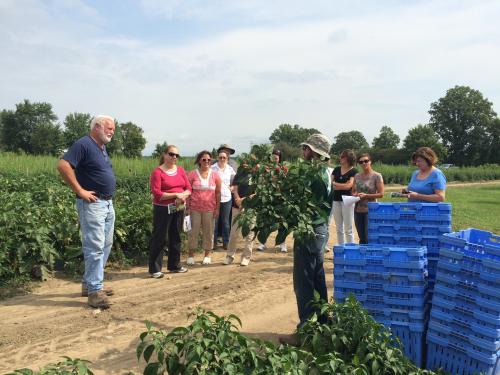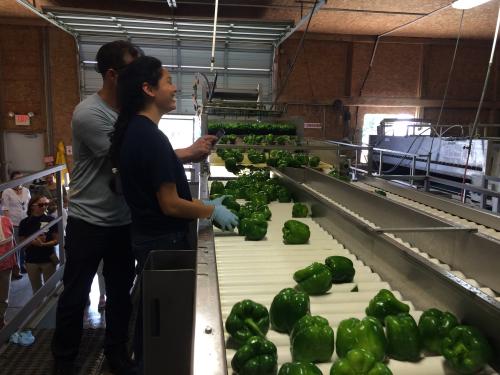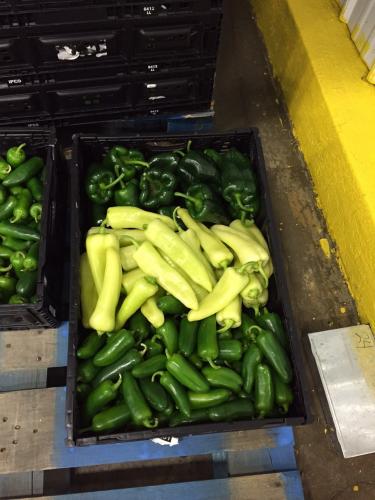Cultivate Michigan initiative promotes Michigan peppers by hosting a field trip
Summer pepper season is well underway in Michigan! A recent Cultivate Michigan field trip in eastern Michigan highlighted the importance of the summer pepper crop to farmers, the versatility of the crop, and its value to institutional food purchasers.

Sweet and spicy Michigan peppers are a highly nutritious and versatile vegetable for individuals and institutional food service staff alike. They boast high nutritional value, an abundance of varieties and uses, and summertime availability. A recent Cultivate Michigan pepper field trip for institutional food service directors, led by three Michigan State University Extension vegetable and food systems educators, hosted participants representing hospitals, food banks, food hubs, farmer’s markets, senior centers and school districts. This pepper tour highlighted on-farm production, retail and wholesale marketing and distribution, and included a farm market, pepper production fields, packing lines and cold storage areas. Michigan farmers commit 2,200 acres to pepper production, with over half of the nearly 1500 farms producing sweet bell peppers in a range of colors. Second only to bell peppers, Michigan farmers also grow large quantities of sweet banana and spicy hot peppers, the majority of which go into processing.
This tour was hosted by the Michigan Farm to Institution Network, and its institutional purchasing campaign Cultivate Michigan, which is co-coordinated by Michigan State University Center for Regional Food Systems and the Ecology Center and is supported by Michigan State University Extension. Goals for the Cultivate Michigan pepper tour included learning first-hand about pepper production and distribution; connecting institutional buyers with local farmers and distributors, and providing networking opportunities for Farm to Institution stakeholders. Farmers fielded many questions from the institutional representatives about their growing practices and experiences with institutional clients and markets.

Pepper plant discourse Van Houtte farm field
The tour met on August 14, 2015 at George VanHoutte’s Northern Farm Market in Romeo, which features over 40 different varieties of Michigan fruits and vegetables that are grown on 700 acres in northern Macomb County. George is the third generation farmer in his family and he highlighted pepper production of eight different pepper varieties for the tour participants. George also described the farm’s specialty crop rotations and his innovative Farm to Factory Program – delivery of reasonably priced bags of mixed seasonal produce to workplaces in Southeast Michigan within a 50 mile radius. This program is tailored to the workplaces it serves - in some cases, employees receive the produce in their workplace as part of an employee appreciation initiative, and in other cases, the bag of produce is part of a workplace wellness program paid through direct payroll deductions.

Washed pepper sorting at Mike Pirrone produce
The tour next stopped at the Mulefoot Gastropub farm to table restaurant in Imlay City for lunch, recently featured in the summer 2015 edition of Edible Wow magazine, to network, enjoy delicious seasonal foods, and prepare for the afternoon tour destination. The next stop was at Mike Pirrone Produce in Capac, a family owned business in operation for over 60 years. The business is a main produce brokerage hub for a 3,000 acre farming operation and a marketing facility for a total of 11,000 acres of produce. The tour participants experienced 50 plus acres of pepper production, in which Pirrone Produce grows a variety of peppers. The business also operates a wholesale facility that packs anywhere from 1500 to 4500 bushels of peppers a day, in addition to other seasonal produce they grow, aggregate, package, distribute and wholesale. Joe Pirrone and Henry DeBlouw led the tour, highlighting their vast production capacity and innovative growing practices, the wholesale brokerage, and delivery of produce that supports $25 M in annual sales for their business. Joe Pirrone highlighted the potential for growth to institutional markets, largely due to their acceptance of imperfect produce (curvy cucumbers, lopsided peppers, etc.) that can’t be sold to retail outlets. It was interesting to see the different scales of production at the two farms, and to compare their growing practices and ultimate customers, which included large retailers, fresh market sales and farm to workplace sales.

Pirrone peppers in crate
Cultivate Michigan is a statewide local food purchasing campaign targeting institutions, including K-12 schools, hospitals, colleges/universities, early childcare and long-term care facilities. This initiative supports the Michigan Good Food Charter goal of sourcing 20 percent of food from within Michigan by the year 2020, and provides the means for tracking institutional purchases through a dashboard. Peppers are the second featured food of the Cultivate Michigan campaign in 2015, and a corresponding product purchasing guide for institutions has been developed to assist in sourcing and using Michigan peppers. Check out Cultivate Michigan’s pepper resources, as well as all the resources for their other featured foods!
For more information on the Michigan Farm to Institution Network, which is working to link farm to institution efforts across the state and create opportunities for learning, resource sharing and collaboration, click here. For more information on Michigan State University Extension’s Community Food Systems team and its work to build a sustainable food system across Michigan, click here.



 Print
Print Email
Email


